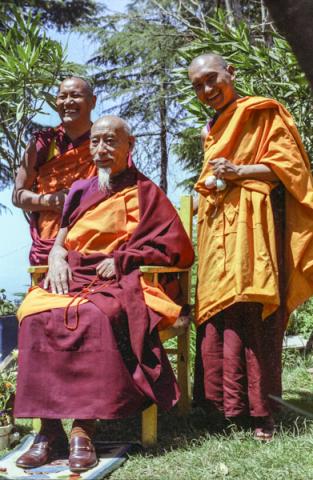E-letter No. 243: September 2023

Dear Friends,
Thanks for subscribing to our monthly e-letter. Feel free to share it with others!
In this month's issue we have a new video and podcast to share, new teachings and advices, as well as several new texts produced by Piero Sirianni to freely download as PDFs on our website, including The Heart’s Utmost Need, a text translated and extensively revised by Lama Zopa Rinpoche. We are also featuring our auxiliary website, Teachings from Tibet, as a reminder to visit and explore this great resource of lamrim teachings and articles.
And you don't want to miss this month's teaching by Lama Yeshe on the profound benefits of reciting mantras. Please enjoy!
From the Video Archive: The Benefits of Living in the Vows
This month from the video archive we bring you an informal talk given by Lama Zopa Rinpoche at Nalanda Monastery in March, 2001. Rinpoche lays out the great benefits of living in the vows by describing how the vows subdue the projections of the mind and thus enable realizations; how the vows create peace in one's heart and thereby contribute greatly to world peace; how the minds of lay students are transformed and inspired by simply seeing the robes of a renunciate teacher; and how, by living in the vows, we repay the immeasurable kindness of the Buddha.
To receive more advice from Lama Yeshe and Lama Zopa Rinpoche on the great benefits of practicing Dharma as an ordained person, please refer to Advice for Monks and Nuns.
Visit and subscribe to the LYWA YouTube channel to view more videos freely available from our archive. See also the FPMT YouTube channel for many more videos of Lama Zopa Rinpoche’s teachings.
On the LYWA Podcast: It’s all in your mind

You have no enemy when you don’t have anger. Only when you have anger you have enemy in your life. So it’s all to do with your concept. It’s all in your mind.
-Lama Zopa Rinpoche
This month on the LYWA podcast we invite you to listen to teachings by Lama Zopa Rinpoche on the awesome power of our perfect human rebirth. These teachings are from a commentary Rinpoche gave on the Eight Verses of Thought Transformation, an essential mind training text composed by Kadampa Geshe Langri Tangpa, and were hosted by Tse Chen Ling Center, in San Francisco, California, in November 2003. You can also listen along with the transcript on our website.
The LYWA podcast contains hundreds of hours of audio, each with links to the accompanying lightly edited transcripts. See the LYWA podcast page to search or browse the entire collection by topic or date, and for easy instructions on how to subscribe.
WHAT'S NEW ON OUR WEBSITE

This month we have posted the 39th Kopan Course, lamrim teachings given by Lama Zopa Rinpoche at Kopan Monastery, Nepal, in 2006. In these teachings Rinpoche advises that this human body is unbelievably precious because we have the opportunity to practice Dharma and complete the path to enlightenment. Other topics taught by Rinpoche in this course include the Prasangika view of how things exist, the benefits of refuge and how cherishing others is the cause of happiness. You can read these teachings online or download a PDF of the entire course.
Also new this month are several texts produced by Piero Sirianni. These freely available PDFs are designed and shared by Piero for viewing on your tablet, mobile device or computer. Please enjoy:
- The Heart’s Utmost Need, a text translated and extensively revised by Lama Zopa Rinpoche and first published as Heart-Spoon.
- Lama Chöpa and Tsog Offering, a practice of guru devotion within the Gelugpa tradition.
- Updated versions of Prayers for the Swift Return of Lama Zopa Rinpoche and the Eight Verses of Thought Transformation.
Every month we share new advices for Lama Zopa Rinpoche’s Online Advice Book, adding more than 100 new entries every year on a variety of topics. More precious than ever, there are now more than 2,200 of Rinpoche’s advices online. Here are a few more:
- Use the Sickness as a Path to Happiness: In this long letter to a student who was having health problems, Rinpoche explains how to transform problems by practicing tonglen (taking the suffering of others and giving them happiness.)
- Goodbye to Samsara: A student wrote that their goal was to attain lamrim realizations and to focus on calm abiding and mahamudra. The student asked Rinpoche if it would be best to retire soon so they would have more time for retreat and practice.
- Circumambulating and Offering Music to Holy Objects: Rinpoche advises a student how to circumambulate holy objects and how to offer music. Rinpoche discusses the motivation, the benefits, the actual practice and how to dedicate the merits.
- Practices After an Abortion: This advice was given to a student who had an abortion and asked what she needed to do to purify the karma.
You can always find a list of all the newly posted advices from Lama Zopa Rinpoche on our website.
Explore Teachings From Tibet

As many of you may already know, we have established an auxiliary website, Teachings from Tibet, featuring the teachings of exceptional Tibetan lamas such as HH Ling Rinpoche, HH Trijang Rinpoche, HH Serkong Rinpoche, HH Zong Rinpoche, Khunu Lama Rinpoche, Geshe Sopa Rinpoche, Geshe Rabten Rinpoche, Geshe Ngawang Dhargyey and many others. Over the years we have received additional transcripts from these and other great Tibetan lamas, and we decided to make these all available on this website.
We recently posted a teaching by Kirti Tsenshab Rinpoche, How to Help the Dying and Those Who Have Died, from the collection of Ven. Pende Hawter, founder of Karuna Hospice, a palliative care service in Brisbane, Australia. You can also find lamrim teachings by Ven. Geshe Doga, Tara Institute, Australia, translated and published by Ven. Fedor Stracke at Happy Monks Publication. Please check it out and let us know what you think.
You can also order a print copy of Teachings from Tibet, download a PDF, or listen to the audiobook on Google Play or find the audiobook here on our YouTube channel.
As always, thank you so much for all your interest in LYWA. Read on for this month's teaching by Lama Yeshe on the great benefits of mantra recitation.
Big love,

Nick Ribush
Director
THIS MONTH'S TEACHING: Lama on the positive vibration of mantra

Mantra recitation is very useful. We should recite mantras instead of indulging in our usual mundane, ridiculous chatter, which neither helps nor benefits us. Useless speech merely results in conflict. As we engage in useless, mundane, worldly speech, at the same time, we visualize. Words create pictures; words symbolize existent phenomena. So, whenever we converse, we’re visualizing a kind of hallucinated picture of the world. That automatically brings a conflicted reaction.
So mantra is very useful, especially the very powerful Guru Shakyamuni mantra, TADYATHA OM MUNÉ MUNÉ MAHA MUNAYÉ SOHA. When you recite mantras, your mind is automatically integrated rather than split. Furthermore, your speech becomes blessed and positive.
To put it simply, since the time of our birth up until now we’ve been living under the influence of a disordered mental imagination. Everything we see is through that lens and it brings the reaction of further mentally disordered imagination. Whatever we visualize in the world brings more confusion and disorder into our mind. Our speech and our actions also contribute to this and it all conspires to bring us down; our entire everyday life is brought down, torn down, like this. It’s so simple. The whole thing is just our own samsaric trip.
So when we recite mantra we bring ourselves up a bit, we get ourselves together rather than destroying ourselves all the time. The meaning of mantra is profound, and mantra itself is in the nature of supreme wisdom energy rather than having delusion as its source. With mantra, our mind’s vision is positive, divine and holy, and our speech transcends ordinariness or useless conversation, becoming tranquil and healing.
When we chant the prayers we do, it’s not just for the emotional sensations they might bring. Take, for example, the lamrim prayer the Foundation of All Good Qualities. When we recite it, we bring to mind its essence, the three principal aspects of the path to liberation. That’s what it signifies. When we recite it, we automatically visualize its meaning, which displaces the usual garbage that normally fills our mind and brings a negative reaction. It automatically elevates our mind. So prayers are not just the words or something we sing simply to experience some kind of emotional pleasure. It’s possible we sometimes do that, isn’t it?
If we allow our minds to degenerate, we can finish up using prayers merely for the sentimental pleasure of a samsaric trip. If we lose their profound essence, they become completely devoid of meaning. Doing that, we transform a deeply meaningful thing into kaka.1 If, instead, we recite prayers and mantras with a profound understanding of their incredible meaning, our minds can transcend their normal worldly existence and attain a state of bliss. So, such recitations are very, very useful.
What happens when we recite mantras is that our speech is slowly, slowly rectified until finally our speech itself becomes mantra—our speech becomes mantra and our mind becomes mantra as well. Normally we think that for our speech to become profound, to attract people, what we say depends on the words we use and nothing else. We think, “In order to get people to listen to me and to attract others, I need to have a fantastic vocabulary and a great delivery.” But I say it’s not just the words we use that attracts others. The words help a bit, but besides the words, beyond the words, there’s some force, or power, that makes other people take interest in what we’re saying. It’s not just the words.
So, what I’m saying is that when through recitation of mantra we attain a certain state; whatever we say becomes like a mantra. It’s possible. Automatically, whatever sound you make is a divine reflection and gives others a positive vibration. It becomes a mantra. Possible. Anyway, your speech becomes very powerful.
The Mahayana tradition holds that by reciting millions of mantras you can purify yourself to where you suddenly get a flash of telepathic power and can almost see the whole world right there in front of you. You can’t believe it! That kind of thing can happen. Also, you can read others’ minds. All that is possible.
Lama Yeshe gave this teaching at Manjushri Institute, Cumbria, England, in 1976. From the forthcoming LYWA book Clean Clear: Collected Teachings, Volume 2. Edited by Nicholas Ribush. You can find Volume 1 here.
1 Editor: I can’t find it in any transcript now but I recall Lama Zopa Rinpoche saying once that he and Lama Yeshe learned the words kaka and pipi from their first Western student, Zina Rachevsky.
